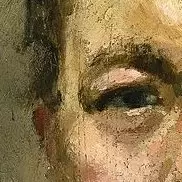Aside
For an extra boost to your enjoyment, consider listening to (Rimsky-Korsakov 2nd Symphony, Antar, movement 1: Vengeance)[https://youtu.be/Qd80g7wJWuQ?si=aZoRQ8PcU3_9OR_c]. This was the music that the artist listened to as he created the piece.
Ivan the Terrible and his son
A very sad piece indeed. Ivan the terrible’s mental illness came to a horrible climax one night when he saw his son’s pregnant wife walk by in a nightgown that exposed her under garments. Blind with rage, he struck his son in the head fataly.
The painting depicts Ivan the Terrible, stricken with grief and anguish as his son dies. The son, in tears, forgiving his father in some cosmic understanding as he lay dying.
On the surface, an example of how mental illness, left to take more and more control, can result in horrible consequences.
However, looking at the dates; the event occurred about 300 years before the painting was created. Why?
The political environment
The painting is an allegory of the assassination of Alexander II. Or rather the atrocity of the action itself and the consequences.
A group of far-left terrorists, bent on removing the autocratic tsarist government, killed A2 with a bomb in 1881; influenced by “Propaganda by the Deed,” hoping it would spark a revolution.
The painter not only witnessed the assassination, but also the hanging a few months later of the men who committed the act. He was horrified by the violence, he called them horrors of the contemporary world.
Aftermath
The act of terrorism failed and it would not be for another nearly 40 years, when things had gotten so bad and the tsars so weak that the Bolsheviks were able to succeed and establish a Soviet Republic, but only after killing basically everyone that knew how to do anything: Doctors, Lawyers, Farmers, etc. Leaving the country in tatters and the government free to be run by one person, who would go on to commit awful such atrocities that it made the whole history of the tsars look like childs play in comparison.


The number of people sent to the gulags was never as high as it had been under the tsar, nor were it’s death rates. If you look up any data on the subject, you’ll find your conception of the USSR’s justice system is entirely fictional.
And then I suppose Stalin ate all the grain himself? Maybe ask yourself how you got tricked into believing a gov’t seizing and distributing hordes of grain during a famine was a bad thing.
Every one of your points are either abjectly false or wild distortions that would take too long to look up each one.
There’s criticisms to be made of Stalin without making shit up.
Ok friend, sorry we couldn’t come to an understanding.